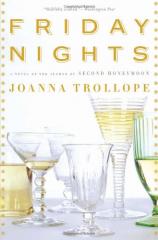Reading Group Guide
Discussion Questions
Friday Nights

1. Consider how Trollope introduces the reader to each character of Friday Nights. Which character makes the strongest first impression? Which character takes the longest to get to know?
2. “Being alone, Eleanor knew, was not in itself undesirable: it was the circumstances of aloneness that made it either friend or foe” (3). What are the circumstances of Eleanor’s aloneness at the beginning of Friday Nights? How does her solitude resemble the loneliness she recognizes in Paula and Lindsay? How is it different?
3. Paula’s manager tells her, “Men aren’t a career, you know. A man isn’t your life’s work, however much he’d like to be” (23). How does Paula treat her relationships with men as careers? What role do Paula’s finances play in this question of men-as-career? What role does Toby play?
4. Blaise theorizes that domestic spaces “were more manifestations than settings…Maybe the room was her, just as Karen’s more ethnic sitting room was her and Lindsay’s neat, pastel one was her” (84). How does this theory of domestic manifestation apply to Paula and her loft? How about to Eleanor, who admits that she is not “a houseproud woman” (244), and to Jules, who has no house of her own?
5. Jules tells Paula, “We know each other…we’re part of the same group. Women. And groups like ours, well, we tell each other stuff. Don’t we?” (139) What differences between female and male companionship and communication are evident in Friday Nights? When do traditional assumptions about women’s communication break down?
6. Visiting Lucas’s art studio, Blaise thinks, “he had never seemed so much a painter to her as he seemed now, standing in this high, bright, bare room with nothing on the easel” (155). How is this statement contradictory? What truth lies within this contradiction?
7. Friday Nights is narrated from numerous points of view, both children’s and adults’. What do Toby and Rose’s perspectives add to the novel? And Jules’s youthful point of view? What unique details of a younger perspective does Trollope pick up on?
8. Considering her differences from Karen, Blaise thinks, “Karen played herself, and only herself, in all her life roles and she, Blaise, presented different facets of herself, depending upon the role required of her” (251). Is Blaise right, or does Karen’s life also involve multiple roles?
9. Young Toby believes, “Adults, it seemed, could be as unreliable (Jackson) as they could also be trustworthy (Eleanor) and the misery inflicted by the former quality was best dealt with by deletion” (298). Are Toby’s one-word characterizations of Jackson and Eleanor too simplistic? Why or why not?
10. What is surprising about the successful domestic match between Eleanor and Jules? What seems natural about it? How do these two women make their cohabitation work?
11. Eleanor eventually deems Jackson not a liar or fraud, but a “catalyst” (307). What volatile reactions does Jackson spark among the Friday night group? What motivates him to try to connect with each of these women? Are his intentions malicious? Why or why not?
12. At the end of the novel, Karen, Lucas, Rose, and Poppy are preparing to move from London to Dorset. How might their family dynamic change in small-town life? What kind of teaching style would Lucas have in his art classroom? What kind of career could Karen find in Dorset, one in which she could use “all [her] capabilities,” as Eleanor puts it (308)?
13. In her acknowledgments, Joanna Trollope thanks the people who introduced her to “two completely new worlds” --- house music and British football teams (329). How is Trollope’s meticulous research evident in the novel?
14. Joanna Trollope’s last novel, Second Honeymoon, explored the problems of one family, while Friday Nights takes on a constellation of friends. In what ways do the friends of Friday Nights resemble a family? How are these characters’ problems similar to, and different from, those in a typical domestic novel?
15. Consider what Friday Nights would be like if the genders were reversed: if a group of men met every Friday night, and a woman arrived in their midst. What would be the context of an all-male social group? What sort of woman could come between them?
Friday Nights
- Publication Date: June 16, 2009
- Genres: Fiction
- Paperback: 334 pages
- Publisher: Bloomsbury USA
- ISBN-10: 1596914084
- ISBN-13: 9781596914087








